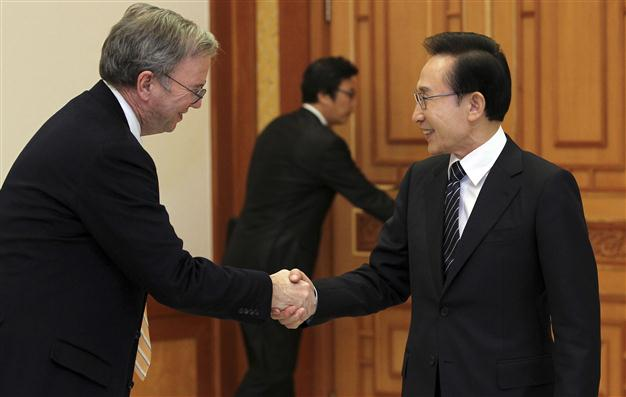Google chief urges S. Korea to open up Internet
SEOUL - Agence France-Presse

In this photo released from Presidential Blue House via Yonhap, South Korean President Lee Myung-bak, right, shakes hands with Google Executive Chairman Eric Schmidt before their meeting at the presidential Blue House in Seoul, South Korea, Monday, Nov. 7, 2011. AP photo
Google executive chairman Eric Schmidt Tuesday praised South Korea's advances in the IT industry but urged it to ease regulations on Internet use.
"It's my view, and I think Google's view, that regulations on the Internet in Korea could be more open and more modern," he told reporters, urging Seoul officials to examine "more liberal policies" of other countries.
The South is one of the world's most wired nations, with 95 percent of homes using broadband Internet. It also has the world's top Internet download speeds, according to a study released by Pando Networks.
But a law requires users to post their real names when uploading material.
In 2009 Google rejected the South's request to require users to provide their real names when uploading videos on YouTube.
Last year it shut down Android's games category for South Korean users, to bypass an obligation that mobile games be rated before their release. Schmidt met President Lee Myung-Bak and the head of South Korea's telecoms watchdog, after arriving Monday for a visit aimed at increasing Google's presence in a country where local firms dominate the Internet search market.
He has also held talks with LG Electronics, SK Telecom, KT Corp and Samsung Electronics, which uses Google's Android operating system for its highly popular Galaxy smartphones.
Schmidt said Google and the Korean government have agreed to resume Android's games category for local smartphone users and game developers.
Google is "absolutely" committed to the openness of its Android platform, he said, and the US company's planned takeover of handset manufacturer Motorola would not have an adverse impact on its Android partners.
The US search giant in August unveiled its plans to buy Motorola Mobility for $12.5 billion, sparking concern among South Korean mobile phone manufacturers.
"It will not violate the openness of Android," Schmidt said, vowing to run Motorola independently.
